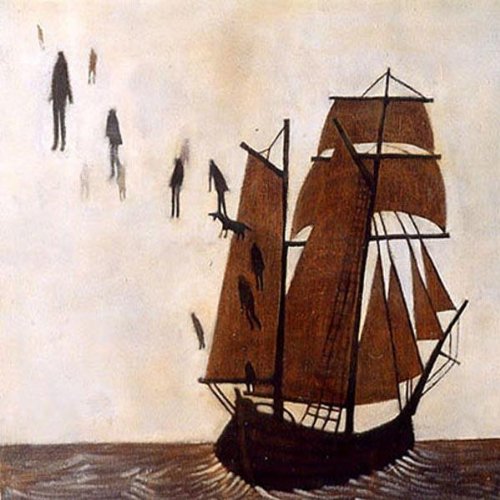The Decemberists Album: «Castaways and Cutouts»

- Customers rating: (4.4 of 5)
- Title:Castaways and Cutouts
- Release date:2003-05-06
- Type:Audio CD
- Label:Kill Rock Stars
- UPC:759656039727
- 1Leslie Anne Levine
- 2 Here I Dreamt I was an Architectimg 4:31
- 3 July, July!img 2:54
- 4 A Cautionary Songimg 3:09
- 5 Odalisqueimg 5:21
- 6Cocoon
- 7Grace Cathedral Hill
- 8 The Legionnaire's Lamentimg 4:44
- 9 Clementineimg 4:26
- 10California One
- 11Youth and Beauty Brigade
have you ever heard a beautiful old celtic song, where upon listening closely to the lyrics you discover it's about how a bride is killed on her wedding day and her ghost avenges her death... and you think "that's a weird thing to write a song about..."
Well, this disc is a lot like that.
I will try to keep this short, as you have surely read by now that The Decemberists' debut album Castaways and Cutouts is inhabited by ghosts, prostitutes, nefarious seamen, and various other rogues. You probably also know that the songs evoke a time virtually untouched by modern civilization.
About half of the songs on the album are at least pretty good. These include the only two up-tempo numbers on the album, "July, July!" and "The Legionnaire's Lament". The strong mid-tempo songs include "Leslie Anne Levine", narrated by the ghost of a stillborn baby, "Here I Dreamt I Was an Architect", and "A Cautionary Song", which is about mother who must sell her body to randy sailors in order to feed her children. "Odalisque" mixes up the tempos, and will require the first - if not second or third - reference to a dictionary for most listeners. The prominent arpeggios toward the end are reminiscent of "Because" by The Beatles. With these five songs going for it, the first half of the album is uniformly strong.
Alas, several songs on the second half of the CD are a bit, well, boring. "Cocoon" slows the tempo significantly, to the detriment of the song and the album. It is quite difficult to remain interested in it over the course of its seven minutes. "Grace Cathedral Hill" is a better song, but does little to add any momentum. The aforementioned "The Legionnaire's Lament" rescues the listener from the onset of ennui, but "Clementine" - a sweet and sincere song worth listening to at least once - threatens to set it right back in.
Fortunately, Castaways and Cutouts closes on a upbeat note, albeit a very long one. "California One/Youth and Beauty Brigade" is the first epic of the group's career. It is a dreamy, mid-tempo number featuring a tasty steel guitar and a seamless transition from its first half to its second. The ironically-named brigade of the title welcomes "bed wetters", "ambulance chasers", "poor pick-pockets", "the light-loafered", and "bored bench warmers". The last verse includes a clever first-person reference to the Multnomah County Library in Oregon, where Meloy's overdue fines were likely very large.
Overall, this is a good debut. It introduces a singular new talent on the indie rock scene. Even when then songs themselves are not that great, the songwriting and instrumentation are solid. Colin Meloy is a great front man with a unique voice, literally and figuratively. His lyrics are vivid and his vocabulary is enormous. Raise your hand if you have ever heard words like "odalisque" (which I think he mispronounces), "parapet", "wastrel", "camisole", "balustrade", "bagatelle", "fecundity", and "charabanc". They should start including Decemberists albums with SAT study guides. Instrumentally, the guitars all almost exclusively acoustic, and accordions add an old-world flavor to several of the songs.
If you are inclined to like The Decemberists, you will enjoy Castaways and Cutouts. If it is the first one that you hear by them, you will be impressed by how much they improve on later albums. If you work your way back to it, you will probably find it to be a bit of a disappointment. One will get a more accurate sense of how good this band is from Her Majesty, Picaresque, or The Crane Wife. Rather than risk not liking Castaways and Cutouts very much, I would highly recommend going with one of their other albums as a first purchase. (Frankly, each of the band's subsequent releases is so much better than Castaways and Cutouts that they render it the least essential of their first four albums.)
I know, I said that I would *try* to keep this short. I failed. Sorry.
There are some bands that one is happy to hear the first time, and there are others that make one feel blessed. Listening to this Decembrists' CD, I reveled in my good fortune; what a wonderful world we live in that can yield music this good.
The Decembrists' "sound" is very distinctive-- organs and accordions feature prominently, while singer/songwriter Colin Meloy's voice is slightly reminiscent of Robyn Hitchcock. Like Hitchcock, Meloy has a uniquely personal writing style, but where Hitchcock is deliriously surreal, Meloy's writing is structured around storytelling. Simply reading through the lyrics (which can be enjoyed in and of themselves), these tales of life's, er, castaways in various exotic time and place settings entertains. Listening to them, of course, is even better.
Throughout, the Decembrists walk a remarkable tightrope. Their music is quirky without being obtuse, literate without being pretentious, catchy with being cloying... I've been listening to a lot of good music this year, and CASTAWAYS might be the highlight. And the fact that they're from Portland is just icing on the cake. Hey, there's a song here called "Here I Dreamt I Was an Architect"! You know, I wrote a guidebook to Portland architecture... and you really don't care. :)
Listen to this CD.
Since its initial release on a smaller indie label, Castaways and Cutouts has been passed around with the same sort of hero-worship that attends Neutral Milk Hotel's In The Aeroplane Over The Sea. That's fitting, since both bands are fronted by gifted songwriters who have a penchant for peddling fantastic and haunting pop narratives. But now that the secret's getting out, many are wondering if the Decemberists are for real, or just flopping in the Neutral Milk Hotel while its owner is on sabbatical.
The short answers to those questions are yes and no. Castaways and Cutouts is incredibly strong. While it is clearly influenced by NMH, the record reveals more than enough originality to warrant the fuss. The Decemberists' Colin Meloy forgoes NMH-proprietor Jeff Mangum's gut-wrenching, breathless delivery and swirling surrealism in favor of a more grounded emotional tenor that sketches maudlin vignettes of characters cutout of history books. At times Meloy resembles a medium giving voice to history's castaways: young vagabonds with "kickabout hearts;" legionnaires pining for their "gay Paree in [a] desert dry;" even an aborted infant still "cling[ing] to [its dead Mother's] petticoat."
Vocally, Meloy is difficult to pin down, as his voice sometimes has a nasal clip that gives him a mild English accent. This is most noticeable on the more up tempo tracks like "July, July!" or "The Legionnaire's Lament," where he reminds of Lee Mavers from the early 90's British pop group The La's. On the slower tracks like the stately "Grace Cathedral Hill" and the forlorn sounding "Clementine," his vocals are similar to Ben Gibbard's from Death Cab For Cutie.
Besides Meloy's voice and acoustic guitar, the accordion and keyboard instruments (Hammond Organ, Rhodes Piano) of Jenny Conlee are the most prominent sounds of this young band. They evoke the anachronistic, post-colonial America that Meloy's lyrical characters inhabit. It's a sound that combines old-world heritage with refreshing freedom. As a result, the band jumps from funeral marches to sidewalk waltzes with ease.
So, while the Decemberists may have stayed a night or two at the Neutral Milk Hotel, they have since hit the cold, cruel road in search of a house all their own. I'm more than happy to go along for the ride.
Barin McGrath...
You have to like a band that draws its name from the early 19th century Russian nobility who chose to rebel against the Tsar. Not surprisingly, Colin Meloy was an English major at the University of Montana, where he headed up his first band, Tarkio, that never got beyond Missoula. But Meloy found his way to Portland where he put together a band that better suited his eclectic tastes. This is probably their most engaging album in that it exhibits Meloy's wonderful storytelling ability with an infectious set of grooves that carry the lyrics. The title implies a loose set of songs but it is actually a very tight album. The band seems to be finally getting the attention it deserves with its latest release, Picaresque. The Decembrists have long been the rage of the alternative radio channels, keeping up a hectic touring schedule and playing to rapt fans across the country. A far cry from Meloy's early days in Missoula when he was playing "party music" at college bars.

